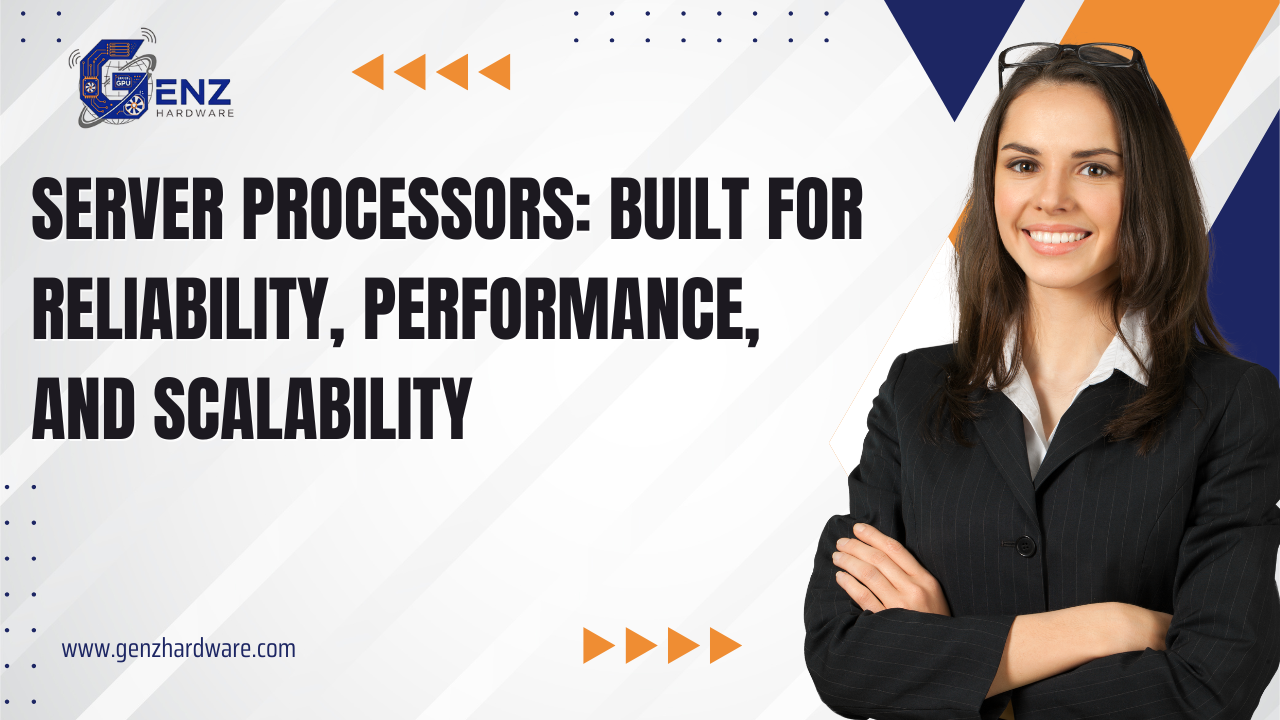
Server Processors: Powering Enterprise-Grade Performance and Reliability
In the world of enterprise computing, the server processor — also known as the server CPU — plays a vital role in ensuring smooth performance, scalability, and reliability. Unlike standard desktop CPUs, server processors are engineered to handle continuous 24/7 operations, multi-user workloads, and data-intensive tasks without performance degradation.
Whether it’s hosting websites, running databases, or managing virtual machines, a robust server processor ensures that your business infrastructure runs seamlessly and efficiently.
What Are Server Processors?
A server processor is a specialized central processing unit designed for servers and data centers. It is built to perform highly parallel operations, manage large memory capacities, and support multiple users or systems simultaneously.
Server CPUs are optimized for reliability and uptime, often featuring error-correcting code (ECC) support, multi-core architectures, and advanced thermal management for continuous heavy workloads.
Key Features of Server Processors:
-
High Core Counts:
-
Designed with more cores and threads to handle multiple workloads simultaneously.
-
-
ECC Memory Support:
-
Ensures data accuracy by detecting and correcting memory errors automatically.
-
-
Scalability:
-
Supports dual- or multi-CPU configurations for added power and performance.
-
-
Virtualization Ready:
-
Ideal for running multiple virtual machines and cloud-based applications.
-
-
Extended Lifespan:
-
Engineered for 24/7 uptime with minimal downtime or failure rates.
-
-
Enhanced Security Features:
-
Hardware-level encryption and threat detection for enterprise-grade protection.
-
Popular Server Processor Brands and Series:
1. Intel® Xeon® Series:
-
The most recognized name in the server market.
-
Offers exceptional scalability, multi-core performance, and ECC support.
-
Ideal for data centers, AI workloads, and business servers.
2. AMD EPYC™ Series:
-
Known for high core density and superior performance-per-dollar ratio.
-
Excellent choice for virtualization, cloud, and HPC (High-Performance Computing).
3. ARM-Based Server Processors (AWS Graviton, Ampere):
-
Focus on energy efficiency and scalability for modern cloud infrastructures.
Applications of Server Processors:
-
Web Hosting and Cloud Computing
-
Database Management Systems (DBMS)
-
Virtualization and Hyper-Converged Infrastructure (HCI)
-
Artificial Intelligence (AI) and Machine Learning (ML)
-
Enterprise Resource Planning (ERP)
-
Big Data and Analytics
-
High-Performance Computing (HPC)
Why Choose Server-Grade CPUs Over Desktop CPUs?
While desktop processors are built for speed and responsiveness in single-user environments, server processors are optimized for multi-user workloads, long-term stability, and data integrity.
They can operate non-stop for years, handle enormous memory bandwidths, and manage dozens of tasks simultaneously — making them the ideal choice for enterprise-level computing.
How to Choose the Right Server Processor:
When selecting a server CPU, consider:
-
Core and Thread Count: For parallel workloads and virtualization.
-
Socket Compatibility: Match with your server motherboard.
-
Power Efficiency (TDP): Important for energy management in data centers.
-
Scalability: Ability to add CPUs for future performance expansion.
-
Cache Memory: Larger caches improve data handling and access speeds.
Conclusion:
Server processors are the powerhouse behind every business-grade IT infrastructure. Their exceptional reliability, scalability, and ability to manage demanding workloads make them indispensable for enterprises, hosting providers, and data-driven industries.
Whether you choose Intel Xeon or AMD EPYC, investing in the right server processor ensures your systems remain fast, efficient, and future-ready for the evolving digital world.








